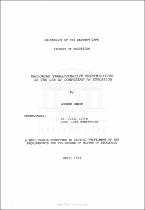| dc.description.abstract | This mini-thesis deals essentially with the issue of computers in- education. It, is a very basic investigation into the impact of computers on the learning and teaching environment and is particularly concerned with the emancipatory possibilities of using computers in the teaching situation. Computer technology, while being regarded by many as a luxury that a changing South Africa cannot afford, is too powerful and
pervasive a phenomenon to be ignored in a modern information society such as ours. Education is about creating opportunities for students to acquire the necessary skills and knowledge to cope with the challenges of society and to transform it. In my mini-thesis I propose that the provision of computer skills to students and teachers, is an important contribution towards the aim of social transformation.
The mini-thesis, is not about. technology per se, but rather about the impact of technology on education. I have attempted to search beyond the level of mere excitement about computers with the purpose of finding ways in which computers can be used to advance emancipatory educational practices. examine the concept of People's Education and its historical roots within the continuing education crisis in South Africa. I briefly describe the education crisis and argue that education is not poligica11y neutral. I show how education is consciously constructed as an ideological state apparatus through which the state reproduces the dominant ideology and associated values. Schooling generally presents the values and interests of the socially dominant groups as if they are universal truths ' Schooling is an important means of establishing and reproducing the social consent and legitimacy for the state to rule in the way it, does. Within a racist, state, such as South Africa has been until now, schooling is an important instrument in maintaining the racist values upon which such a society is constructed.
An important argument of this mini-thesis is that People's Education is an attempt to challenge and transform the power relations within apartheid schooling. Among other things, People's Education attempts to democratise the process of developing learning materials and teaching practices. It. is in this context that I examine the role of computers-in-education. I am interested in establishing to what extent the use of computers help to give students a greater voice. I look at the creative possibilities of materials development and observe who
gets silenced by the introduction of technology within learning groups. I consider to what extent the use of computers Iends itself to collaborative-, peer-Iearning and smal1-group work in order to establish a greater degree of emancipatory practices. An underlying concern in all these is to create wider access to technical skiI1s and resources, which have historically been enjoyed mainly by the privileged groups in the South African society. | en_US |

